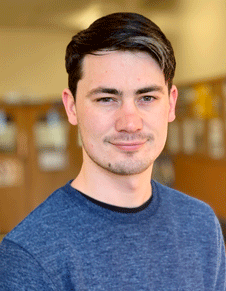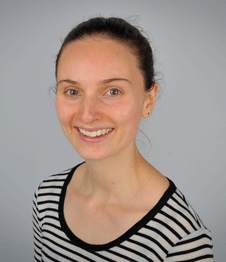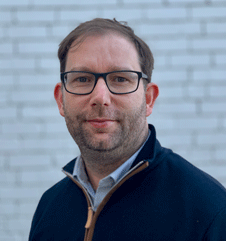Thursday 22 August 2019 11:04pm
Three PhD students will be winging their way to the United States next year to study and collaborate, thanks to a University of Otago fellowship.
The students – all part of the University’s Division of Health Sciences – were selected as this year’s recipients of the MacGibbon PhD Travel Fellowship.
The fellowship is a travel funding opportunity provided by the Alumni of the University of Otago in America Inc. Successful students receive up to NZ$12,000 each and, in the year following their selection, spend between two and six months studying in the United States, collaborating and gaining significant experience in the process.
This year’s recipients (to travel in 2020) have now been selected. They are:
Jamie Manning

Jamie Manning.
PhD student in the Department of Pharmacology and Toxicology, School of Biomedical Sciences, Dunedin
Where are you going with this fellowship?
I’m visiting the Division of Molecular Therapeutics, Columbia University, New York, New York. I’ll be working with Professor Jonathan A Javitch for three months.
What will you be doing there?
β-arrestins are proteins that modify receptor activity after stimulation, and their activity at the cannabinoid receptor is a key interest of my project. With Professor Javitch, I’ll be using single-molecule imaging to measure interactions between β-arrestins and the cannabinoid receptor using various drugs, including plant-based and synthetic cannabinoids.
Why did you choose Columbia University?
Professor Javitch has previously collaborated with my supervisor, Professor Michelle Glass. He has expertise in GPCR molecular pharmacology and his lab has developed a number of novel signalling assays. The single-molecule assay I will be learning nicely complements other datasets I have generated so far and will be a strong addition to my project. I chose this opportunity to strengthen the conclusions of my thesis and further our understanding of receptor/β-arrestin interactions, and to get some exposure to a field-leading research team.
How valuable an opportunity is this, for you?
Being a recipient of the MacGibbon PhD travel fellowship is undoubtedly an excellent opportunity for any developing scientist to build a strong career, especially with the global nature of modern research. Collaboration is key, and strengthening ties with eminent US universities and research teams will be an invaluable asset to form future research networks. It also goes without saying that spending time in the US will be an incredible cultural experience, and I’m excited to find out what there is to offer.
Annabelle Lucy Greenwood

Annabelle Greenwood.
PhD student at the Department of Surgery and Anaesthesia, University of Otago, Wellington
Where are you going with this fellowship?
I will be travelling to the Masonic Medical Research Institute (MMRI) in Utica, New York. I will also briefly visit the Broad Institute in Boston. I'll be under the supervision of Dr Tucker, an Instructor in Medicine and a Research Leader. I'll be there for eight weeks.
What will you be doing there?
The purpose of my visit is to learn skills in the area of single-cell RNA-sequencing. This is a challenging biomedical technology but cutting edge in the field of cancer research. I'll be taking over some human bowel cancer samples for processing for my PhD as well.
Why did you choose the Masonic Medical Research Institute?
My supervisor, Dr Danielson, actually sought this opportunity for me through her connections with the Broad Institute and Dr Tucker. I decided to take on this opportunity because it will enhance my skillset in biomedical research and allow me to make connections outside of New Zealand.
How valuable an opportunity is this, for you?
Not only will the MacGibbon PhD travel fellowship allow me to experience another country, city and research facility but it also means I can bring back to Wellington a really advanced skill.
Nick Bowden

Nick Bowden.
PhD student at the Department of Women’s and Children’s Health, Dunedin School of Medicine
Where are you going with this fellowship?
The MIND Institute, UC Davis, California, where I’ll be working with Associate Professor Meghan Miller for two months.
What will you be doing there?
Basically rubbing shoulders with, and picking the brains of some of the world’s leading Autism Spectrum Disorder (ASD) researchers. The trip will give me the chance to do some clinical observations and see how state of the art technologies, leading clinicians and health professionals work to improve the lives of people with ASD and their families.
Why did you choose the MIND Institute?
The MIND Institute is a world leader in autism research and there is no equivalent in New Zealand. I really wanted to spend some time there, to learn where the field is at, and spend some time with researchers of such high calibre. I love California, too!
How valuable an opportunity is this, for you?
I’m usually stuck in a computer lab but this opportunity will give me the chance to see first-hand what this field of research is all about. The opportunity to network with the academics and health professionals at UC Davis is a huge factor as well.
About the Fellowship:
Dr John Butler MacGibbon was a proud and committed alumnus of the University of Otago who had lived for many years in the United States, where he worked as a specialist in tropical medicine at Johns Hopkins Hospital in Baltimore.
He left a bequest to the Alumni of the University of Otago in America Inc., who decided the fund would be best utilised to further the growth and establishment of collaborations between Otago and US institutions.
Applications are open to PhD and DClinDent students annually.
